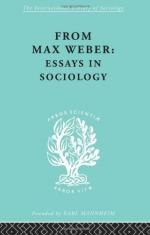|
This section contains 5,887 words (approx. 20 pages at 300 words per page) |

|
SOURCE: "Max Weber Today: An Introduction to a Living Legacy," in Max Weber Today: An Introduction to a Living Legacy: Selected Bibliography, Max Weber Colloquia and Sumposia, 1983, pp. 1-30.
In the following essay, Murvar discusses major issues in the critical literature on Weber's writings.
Max Weber (1864-1920) is generally recognized as one of the major figures in sociological, political and economic theory. Comparisons of his intellectual and scientific legacy with the thought of Machiavelli, Hobbes, Rousseau, Marx, Tocqueville, Keyes and other have been commonplace. Moreover, the extraordinary impact of Weber's interdisciplinary, historical-comparative, however fragmented, achievements has increased to an unprecedented degree as more of his unfinished opus has become available in more adequate translations. In Germany an international academic project is underway to trace the original sequence of his writings in order to reflect more accurately all the aspects of his intellectual growth. It will result in the...
|
This section contains 5,887 words (approx. 20 pages at 300 words per page) |

|


